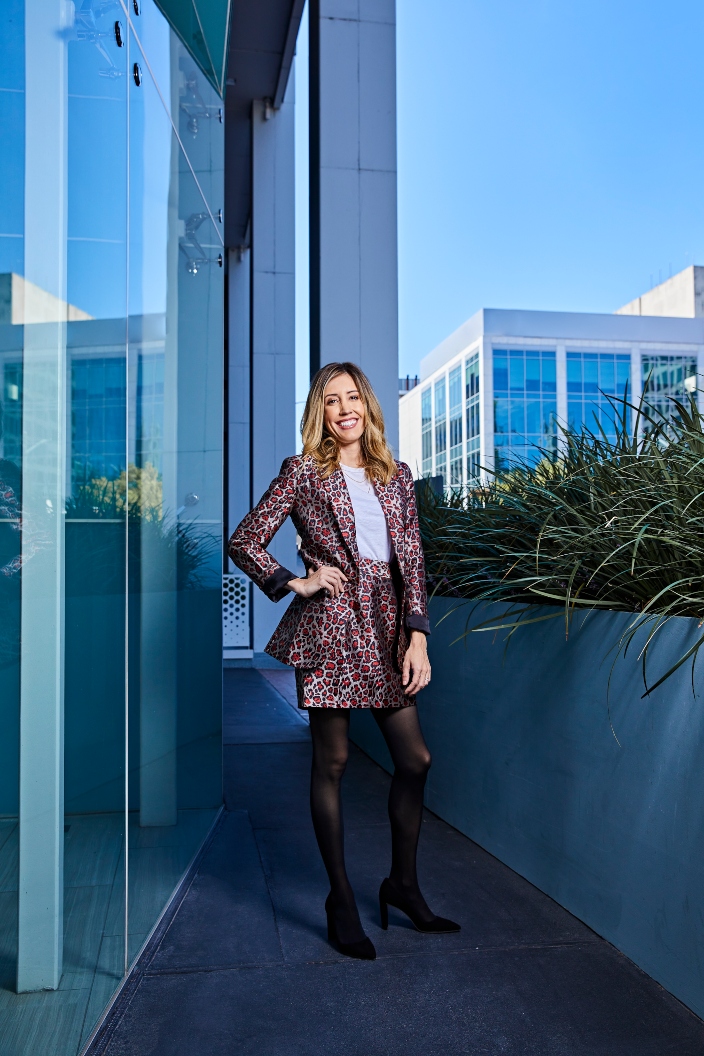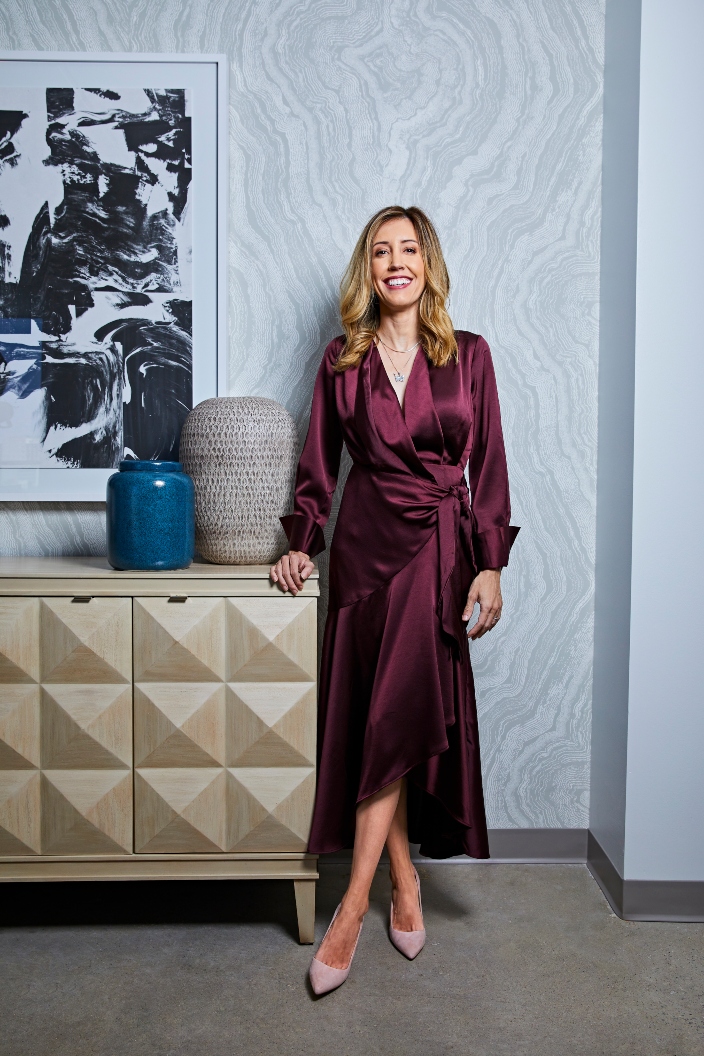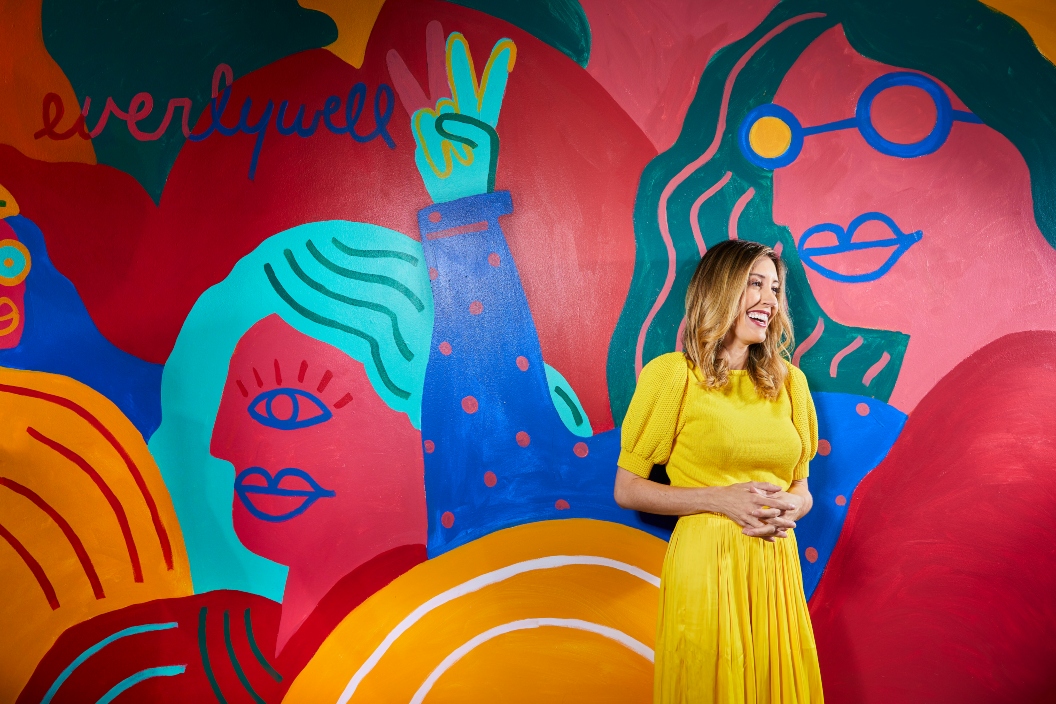Julia Cheek is changing the future of home health care.
By Hannah J. Phillips, Photos by Annie Ray

Julia Cheek is a big believer in the main premise behind Malcolm Gladwell’s Outliers. Your circumstances unlock the dreams you pursue. While most might consider it unfortunate timing to seek a business school degree during the height of a recession, Cheek saw the significant shift in 2009 toward startup mindsets for investment banking and private equity firms one of the blessings behind her career. Likewise, where many startups have suffered in 2020, a year of unprecedented economic setbacks, her company was uniquely positioned to rise to the occasion.
“I’m not who you think of making risky decisions or go[ing]off the beaten path,” she laughs. As the founder and CEO of Everlywell, a digital platform offering over 30 at-home diagnostic tests, Cheek appears to be doing both. But that’s not how she tells the story.
While at Harvard, Cheek studied in close proximity with the co-founders of Gilt Groupe and Birchbox. And she was close friends with Katrina Lake, who later founded Stitch Fix.
“I don’t know if I appreciated it in the moment,” she says. “But I distinctly remember focusing in my second year on entrepreneurial coursework. I realized that if all these people could do it, so could I.”
This was an epiphany for Cheek, who considers herself a “by the book” high achiever.
“I can tell the story in a way that sounds like ramen noodles and apartment floors. But the background to all that was much more intentional. Yes, it was risky, but it was something I planned for quite a while.”
Cheek believes that growing up as an only child to two working lawyer parents set a precedent for her career. She never felt different for being a female in business. From an early age, her father taught her about 401(k) plans, financial management and more. Both her parents encouraged Cheek’s early independence and inherently driven personality. They also promoted a sense of balance in her free time.
“In high school, I was taking the max amount of AP classes possible. And my parents actually wanted me to pull back a bit. Which tells me it was both my own personality and the fact that I had such a strong childhood and a great foundation.”
I realized that if all these people could do it, so could I.
Graduating from Vanderbilt with a double major in economics and psychology, Cheek entered the consulting world at Deloitte in 2005 before pursuing her master’s at Harvard Business School. Moving back to Dallas, she worked for a time at the George W. Bush Presidential Center, hiring leaders for their 501(c)(3), before she was recruited to work with Pam Patsley of MoneyGram in 2013. All the while, Cheek was dreaming up her own company and testing ideas for startups that would not only be successful but also have an impact.
“I didn’t found a startup straight out of business school,” she says. “I knew that I only wanted to start a company if the idea was transformative enough to make a change.”
In its initial stages, Everlywell did not appear to be that idea.

On paper, Cheek actually calls it the worst of her ideas. And while her parents were not discouraging, they weren’t certain it was the one she should bet on either. Undeterred, Cheek knew that percentages aren’t always what they seem. She noted that while there was a 97-99% chance that her idea would fail, the margin of success—while narrow—would also be more sustainable down the road. Where the early exits of most founders is indicative of success, Cheek was looking for something that would be worth her time even if it failed. For her, that was Everlywell.
“I had this view that Americans are having to be responsible for all their health care costs and only continue to be exasperated. We talk about deductibles and hospitable bills, but no one talks about lab bills. I also saw insurance being chipped away at providing coverage. Which has only continued to happen since we started. So I thought people would pay out of pocket for a digital testing experience. I felt like we had an opportunity for price transparency and affordability. I felt like we could move an entire space in a way that people deserved.”
That people-centered desire to innovate continues to drive both Everlywell and Cheek today. Which partly accounts for how her company became one of the first to dive into at-home testing for COVID-19 earlier this year.
“As a startup, we didn’t see why we would get involved in what should have been a government response,” she shares. “But that quickly changed when we saw the major distrust arising from the lack of information and underlying incentives.”
But skipping straight to 2020 overlooks the uphill battles Cheek fought to position her company so remarkably for an unforeseen global pandemic.
With no health care or technology experience, Cheek brings it back to that principle in Gladwell’s Outliers when she recounts those early days.
“It really just takes one person who sees the vision,” she notes. She outlines how an early investor who fundamentally believed in her enabled her to hire chief medical officers, developers and the product designers that made the initial stages of Everlywell possible. After raising her seed round, Cheek and her husband moved to Austin to take advantage of its talent market and innovative underculture. They drove their U-Haul to Austin on the Friday before South by Southwest in 2016, she recalls. Renting a townhouse in the South Lamar area sight unseen.
“Those four years were very gritty years of taking the startup from one employee to 80,” she says. Reflecting on seasons of seemingly endless roadblocks and upleveling. “I went from not knowing if the product would have traction to supporting huge clients like Humana and CVS in a very short period of time.”
The biggest learning curve has been shifting from founder to CEO.

Something many founders don’t envision (and often don’t enjoy) when they start a new company. But Cheek also considered her greatest challenge as the most rewarding. Pushing her to find the right people to help bring Everywell’s vision to light.
“At first, you start out doing every job,” she says. “It’s a goal of mine to put myself out of a job in many of these areas. Hire above that by finding people who compliment my weaknesses.”
One such hire is her chief medical officer, Dr. Frank Ong, who she credits as one reason Everlywell was tuned in to early reports of the coronavirus. Ong was studying the news from China at the end of January. So when the Food and Drug Administration (FDA) first indicated a major capacity problem for COVID-19 testing in early March, implementing an Emergency Use Authorization (EUA) for private labs across the country, Everlywell was one of the first to respond.
“Reporters love to use the word ‘pivot’ because it’s the word startups use,” Cheek says. “But in my decision-making and with our board, it was the opposite. We saw it fitting in our value system.”
For Cheek, delivering at-home COVID-19 tests was the complete extension of what Everlywell is already primed to do.
Integrating with labs all over the country to provide technology and infrastructure for at-home consumer testing. In fact, her initial hunch on the market need for transparent, accessible and affordable health care enabled Everlywell to respond so quickly. Because it was already solving the bigger problem. Their unique digital platform enables customers to receive results in record time. Going the extra mile by providing telehealth support from board-certified physicians to walk through the next steps after their diagnosis. Ranging from general wellness (like food sensitivity and allergies) to energy and weight-related issues (thyroid or metabolism) or sexually transmitted diseases, Everlywell already offered over 30 tests pre-pandemic. Expanding their offerings to include COVID-19 tests was a natural next step.
By the time the FDA had issued their EUA, though, it became clear that the United States was already far behind in COVID-19 testing. At Everlywell, this only served to unlock the impact they could make with their existing at-home products.
“People were starting to understand the brokenness of this landscape we had seen for five years or longer,” she says. “So we viewed it as a moment in time for Everlywell to have an important voice and platform in COVID response.”
Identifying the problem of geographic overrun, Cheek notes that labs quickly became overwhelmed in hotspots around the country.
They lacked a central routing place to integrate manufacturers, labs and physicians. Since none of this functionality was new to Everlywell, they’ve not only become the ideal solution for COVID-19, but a prototype for how health care could expand virtually across the other areas of testing they already offer. For Cheek, the pandemic has only proven the need for more accessible solutions across the board.
I knew that I only wanted to start a company if the idea was transformative enough to make a change.
“This idea that everything is centered around one doctor and one location is a broken philosophy,” she says. Hesitant at first to steer the conversation toward politics. Noting that this article will print on election week, however, she almost can’t help commenting on what she predicts as one of the most damaging effects of this pandemic. Namely, an erosion of public trust.
Now that the pandemic has exposed broken systems across both the public and private sectors—uncovering everything from the complexity of the medical supply chain to the impact of foreign relations with China—Cheek hopes that 2020 will continue to be a wake-up call when we look back in the years to come. In her mind, the ongoing response to coronavirus will remain the primary challenge of the president. Whoever is in office for this next phase of the virus. Until the U.S. can rebuild a foundation of trust across all sectors, it’s going to be an uphill battle.
On the other hand, Cheek also views the pandemic as an impetus for positive change in the landscape of virtual care. Bringing much-needed consumer attention to the value of at-home testing. From an accessibility standpoint, the benefits of virtual care offset not only the costs of our current system. But also the inconveniences of taking time off work to get a test. Finding childcare for doctors appointments, scheduling follow-up appointments—the list goes on.
“We’ve seen a tremendous amount of growth even without COVID,” says Cheek.
She notes a spike in home testing across multiple other product verticals. “Now, we’re asking how [do we]become the company that helps people manage these issues at home? How do we help Americans apply this model to the biggest killers in our country like heart health?” Rejoicing in a recent executive hire, Cheek sees the coming year as a stepping stone to the next stage for Everlywell. And a milestone in its mission to become a household brand.

“I’m looking forward to the next phase of not feeling like everything is on fire,” she says. “My job as CEO is to think five years down the road and steer the company in that direction.”
On the home front, Cheek admits she’s barely been afforded a spare moment to think about next steps in her own life. Like so many professionals working from home this year, she’s learned to set strict boundaries around work time, family time and time to disconnect. In order to give herself the space to persevere. Nurturing that balance may look different on any given week. Scheduling an average of 30-40 hours a week of team calls and board meetings around the morning and evening routines with her husband and their son, Crosby.
“Sure it can be exhausting,” she says, “but I’ve always worked more than the average person. And I don’t say that as a badge of honor, but because of how I’m wired. In other jobs, I still worked as much, but I wasn’t driving change.”
As Everlywell continues to refine and expand its offerings, Cheek says they will likewise focus on developing the follow-up care provided on their platform. “Our mission,” she says, “is that whatever the customer needs, Everlywell can enable them to take that next step.”

